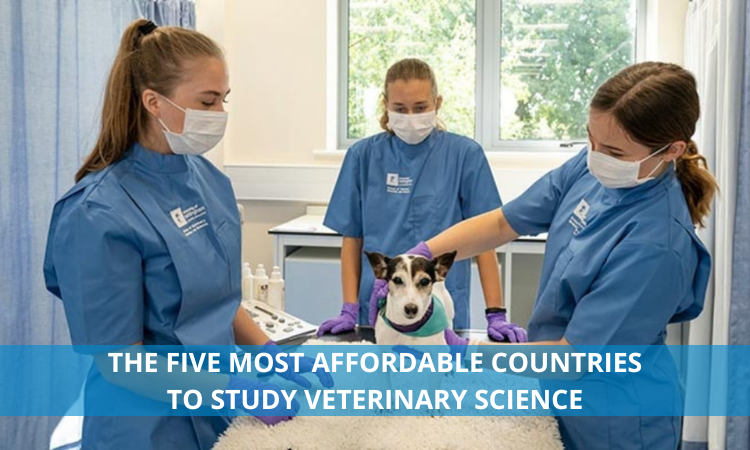
A degree leading to a Doctor of Veterinary Medicine is ideal if you are an animal lover who is interested in improving the lives of animals. Veterinary science requires the acquisition of scientific information necessary for the treatment and welfare of animals.
The majority of veterinary science research focuses on biomedical methods for treating animals. There are many diverse areas of focus in this field, much like in human medicine. Wild animal medicine, domestic animal medicine, population health, and infectious diseases are just a few of the topics covered in veterinary science courses, which also cover topics like anatomy, bacteriology, behavior, epidemiology, immunology, parasitology, pathology, physiology, toxicology, and virology.
Finding the most cheap veterinary studies degree programs can aid those who have a passion for safeguarding animals in their pursuit of that goal. Undergraduates can save thousands of dollars on science classes about both large and small organisms by enrolling in reasonably priced veterinary studies degree programs. Along with the rise in pet ownership, there is an increasing demand for graduates of veterinary schools.
The Faculty of Veterinary Medicine’s mission is to train highly qualified professionals (veterinarians) who are equipped to handle the veterinary medicine challenges of the twenty-first century. These professionals’ primary responsibilities include protecting animal health, protecting animals from harm, preventing the spread of disease from animals to humans, ensuring the safety of food with animal origins for human consumption, caring for feed animals, and protecting the environment. These requirements are closely related to the scientific research that is conducted in the classroom, the findings of which are applied to practice and production.
Exists a company that doesn’t want a candidate with extensive experience working abroad? Most likely not. If you choose to study veterinary medicine in Europe, you will gain experience in a global field, most likely acquire a new language, run into problems that students studying at home won’t, and gain understanding of veterinary medicine from a different angle. You’ll become more autonomous as a result, while also being able to handle unfamiliar situations better. You will be considerably more receptive and less likely to encounter a culture shock or other unfavorable surprises in your job if you study abroad in Europe.
Over 13,323 veterinarian students are studying veterinary science at 85 universities in the US alone. The number of pupils has increased by 2.3% over the previous year. The need for veterinarians is anticipated to rise significantly in most nations as millions of pet owners choose to bring their animals to private practices for treatment.
Sadly, the price of pursuing a degree in veterinary medicine has gone up recently. The average cost of four years of veterinary school plus living expenditures is at an all-time high, according to the VIN Foundation. More than US$200,000 is expected to be spent by residents, and US$275,000 by overseas students.
Fortunately, a few nations provide reasonably priced veterinary science programs.
- Germany
Germany is one of the most well-liked study abroad countries, with approximately 416,437 international students. There are 19 veterinary science programs offered in Germany, which is home to more than 50 universities that are among the top in the world. One of the best colleges in the nation for studying veterinary medicine is the University of Veterinary Medicine Hannover (TiHo).
The institution was founded in 1778 and continues to operate independently now. Aside from its reputation, TiHo provides an affordable education for international students interested in pursuing a bachelor’s or master’s degree in veterinary medicine: US$1,000 per year.
- Austria
Austria has the most affordable veterinary science curriculum in the world, despite its decreased popularity. The sole institution that provides veterinary science courses is the University of Veterinary Medicine Vienna (Vetmeduni). In the 2022 QS World University Rankings by Subject, it comes in at number 26.
But it alone doesn’t distinguish one public university from others. The cost of attending Vetmeduni to study veterinary medicine is nothing. This is applicable during the length of the whole six-year program.
Inexpensive here does not imply worse quality at all. In the 2022 QS World University Rankings by Subject, Vetmeduni is ranked 26th.
- Netherlands
One of the most sought-after destinations for international students is the Netherlands. Over 115,068 international students are studying in the nation at the moment, up 12% from 2021. In spite of the enormous number of foreign students, the Netherlands only has 13 medical universities, and only one of those 13 schools offers veterinary programs.
According to US News, Utrecht University is placed 44th among the best global universities and among the top three medical schools in the Netherlands. The veterinary medical bachelor’s and master’s programs it provides are conducted in Dutch, though. The annual tuition at Utrecht University for non-European veterinary students is $10,295.
- Switzerland
Switzerland is known for having some of the greatest medical schools in the world, making it one of the best places to study medicine. Switzerland is a dream for many international students because of its affordable tuition costs, in addition to its excellent standards and beautiful surroundings.
The University of Zurich, one of the top universities, has a veterinary medical programme. It is ranked sixth in the QS World University Ranking by subject and one of the top veterinary medical schools in Europe.
The goal of this five-year curriculum is to give aspiring veterinarians the knowledge and abilities to treat animal ailments. At the University of Zurich, a bachelor’s degree can be earned for as little as $1,338 USD a year.
- Norway
Regardless of where they are from, the majority of public colleges in Norway do not impose any tuition fees on either domestic or foreign students.
The sole university with a veterinary sciences programme in the nation is the Faculty of Veterinary Medicine at the Norwegian University of Life Sciences (NMBU). It is a 5.5-year programme that prepares students for a range of veterinary-related positions as well as other careers that need proficiency in biology and medical science.
This covers work in the pharmaceutical business, teaching, research, the food safety and public health sector, fish health, animal welfare, slaughterhouse management, and private practice with livestock, pets, and horses.







